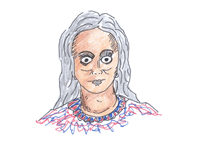|
The classical symptoms of thyrotoxicosis include:
 |
loss of weight |
 |
palpitations |
 |
breathlessness |
 |
emotional lability (mood swings) |
 |
increased sweating |
 |
intolerance of heat, and |
 |
goiter (diffuse enlargement of the thyroid gland). |
 |
| Protrusion of the eyes is often seen in hypenthyroidism. |
Other common symptoms associated with hyperthyroidism are fatigue, anxiety, agitation, mild tremor and muscle weakness. Itching and diarrhea can also be experienced and there can be hair and nail loss. Abnormal growth can occur in children and in premenopausal women, periods are sometimes light, infrequent or absent. Men may develop enlargement of the breasts.
In Graves' disease, the skin around the ankles occasionally thickens with the development of purplish-pink patches on the front of the lower leg. Many patients with Graves' disease have opthalmopathy, a condition in which the eyes appear to stare or bulge (exophthalmos). This is the result of swelling and increased pressure behind the eyeball, pushing the eye forward and causing the lids to pull back. The condition can cause irritation, ulceration and double or blurred vision.
The symptoms of hyperthyroidism often develop very gradually and patients may be unaware of them until they are quite pronounced. In older people, the classical symptoms may be absent and the patient just feels listless, anorexia, depressed and loses weight. The disease may present as heart failure in older patients.
|
| |
|
|
TCM practitioners will examine a sufferer and categorize symptoms under special syndrome groups known as "disharmony patterns." Certain disharmony patterns are present at different stages of a disorder. In hyperthyroid disease these can be classified into the following types:
Liver-qi stagnation, spleen deficiency and phlegm accumulation
Individuals present with depression, chest distress, pain in the area of the ribs, difficulty in swallowing, poor appetite and fullness after meals. They may sometimes experience nausea, weight loss and fatigue, diarrhea and protruding eyes. There is swelling in the thyroid region in the neck.
Deficiency in both qi and yin
Deficiency of these produces emaciation, fatigue and weakness. Sufferers develop an aversion to heat and experience sweating, palpitation, and soreness and weakness in the loin and knee regions. Again, there is swelling in the thyroid region in the neck.
Yin-deficiency and yang-hyperactivity
Individuals tend to be irritable and impulsive. They suffer from insomnia, palpitation, soreness in the loin region, general weakness, an aversion to heat, sweating, a flushed face and blood-shot eyes. They can develop a tremor in the fingers and an increased appetite, becoming easily hungry, thirsty and emaciated.
|
| |
|